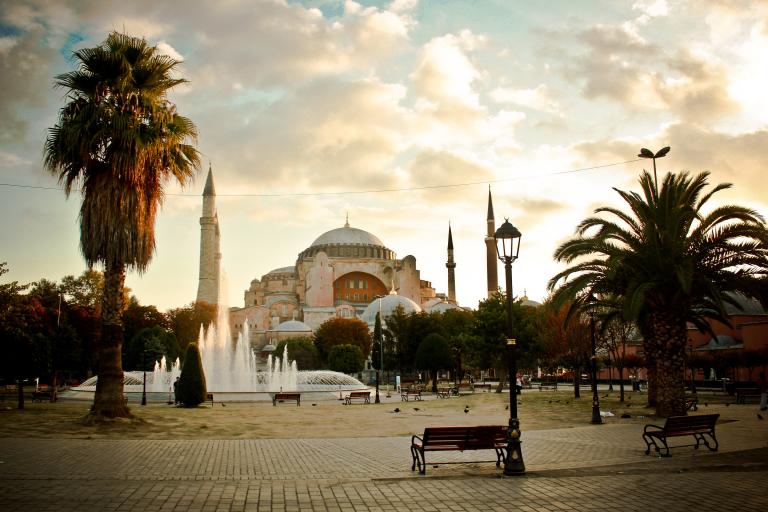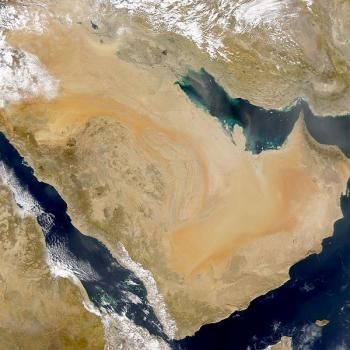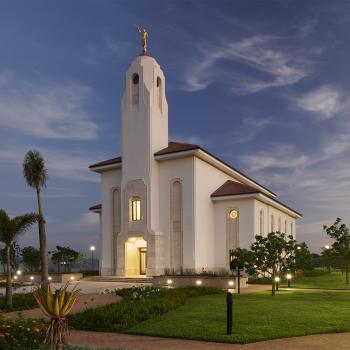
But first, the following item was called to my notice by a high school friend, who is married to a Ukrainian Orthodox priest. On 24 July 2020, the magnificent church of Hagia Sophia — for centuries the cathedral of Constantinople and the largest church in the world, then an Ottoman mosque and then a museum for the past century — again became a mosque. From what I can tell, support for President Erdogan’s regrettable decision is far from unanimous even among Turkish Muslims:
“Hymn of Entry to the Hagia Sophia”
***
The second story that will illustrate the power of poets among the pre-Islamic and early Islamic Arabs occurs a few decades after the rise of Islam. But the figures involved are agreed by virtually everyone to reflect accurately the attitudes of Arabian paganism, so I use it nonetheless. It involves two famous poets by the name of Jarir and Farazdaq, who were (often bitter) rivals throughout their lives.[1] Many other people, poets and non-poets, became involved in the feud from time to time, taking sides in the dispute over which one was the most brilliant. A good modern analogy might be arguments between fans of rival athletic teams.
My story, however, focuses on a rather minor poet who was known as the Camel-herd. This man, the Camel-herd, had loudly expressed his opinion to anybody who would listen that Farazdaq was a better poet than Jarir. His vocal disdain was bound to draw the attention of Jarir, especially since the Camel-herd’s attacks smelled somewhat of disloyalty; Jarir, after all, had written verses in praise of the Banu Numayr, the Camel-herd’s tribe, while Farazdaq had composed poetry that made fun of them. Why would the Camel-herd prefer a poet who had attacked his own tribe to one who had praised it?
One day, Jarir ran into the Camel-herd and his son, who were mounted on mules. Offended by the Camel-herd’s ingratitude, he argued with him but received no satisfactory reply. Meanwhile, the Camel-herd’s son, an obnoxious young man by the name of Jandal, was watching with mounting impatience. Finally, he could bear it no longer. Referring to Jarir’s tribe, he cried out, “Why do you halt before this dog of the Banu Kulayb, as though you had anything to hope or fear from him?” Then he gave his mule a sharp lash with his whip, meaning to leave Jarir in the dust. But the animal started violently and kicked Jarir, who was standing by it, knocking his hat to the ground. The Camel-herd pretended not to notice and rode to catch up with his son.
Jarir bent over, picked up the hat, carefully brushed it off, and put it back on his head. Then he exclaimed in verse:
O Jandal! What will Numayr say of you
When my dishonouring shaft has pierced your father?[2]
Furious, he returned home. Following the evening prayer—he was a pious Muslim, after his own slightly weird fashion—he called for a jar of date wine and a lamp and set to work on a new poem. After a while, an old woman who was in the house heard his muttering, and climbed the stairs to see if he was all right. She found him crawling naked on his bed as if he were possessed. Astonished, she ran down the stairs yelling, “He is mad!” In something of a panic, she described what she had seen to the other people who were in the house. “Don’t be concerned,” they told her. “We know what he’s up to.”
By sunrise the next morning, Jarir had composed a satire, eighty verses long, against the tribe of the Banu Numayr. When he’d finished the poem to his satisfaction, he shouted out in triumph Allahu ahbar! (“God is most great!”) and rode off to the place where he expected to find the Camel-herd, along with Farazdaq and other friends of the Numayr tribe. Arriving there, he wasted no time greeting anybody, but immediately began to recite the poem he had composed.
It was devastating. As he spoke, Farazdaq and the Camel-herd bowed their heads, and the other tribesmen of Banu Numayr sat in silent mortification at what they were hearing. Finally, Jarir spoke the last words of his poem:
Cast down your eyes for shame!
For you are of Numayr—no equal of Kaab nor even of Kilaab.[3]
At that, the Camel-herd jumped up and hurried to his tent as fast as his mule could carry him. “To the saddle! To the saddle!” he called out to his comrades. “You cannot stay here any longer! Jarir has disgraced you all!”
They left Basra immediately and went out into the desert to rejoin the rest of their tribe, who bitterly scolded the Camel-herd for stupidly drawing the fire of Jarir upon them. By his rashness, and that of his son, the entire tribe of Numayr had been shamed. And even hundreds of years afterwards, the lines of Jarir were remembered, and the name of the Camel-herd was a hiss and a byword among his people.
[1] Jarir’s name is pronounced with the emphasis on the second syllable (Juh-reer).
[2] Cited at Nicholson, A Literary History of the Arabs, 245. I have modified the translation slightly.
[3] Kaab and Kilaab were other tribes of pre-Islamic Arabia.












